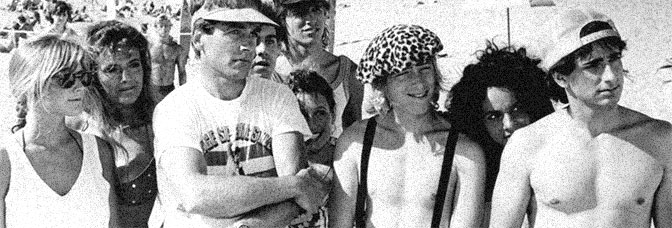There’s an almost magical competency to Summer School. It starts with the opening titles, which are expertly edited to showcase the eventual primary cast members. Not the adults–outside lead Mark Harmon–rather the students. There’s no audible dialogue, just a rock song playing, but there’s enough performance from the actors to give personality to their characters before they get introduced. It’s a magical competency because it’s not just Bud Molin’s editing or Reiner’s direction of the actors or Jeff Franklin’s screenplay–it’s unclear whose idea it was to go with this efficient introduction–but it prepares the viewer for what’s to come. It encourages sympathy to this cast of characters, something the film builds on for quite a while.
Molin’s editing is strong throughout the film, so I guess I’ll talk about he and Reiner first. There’s no gloss to Summer School. Reiner’s most complicated sequence, outside a gore scene where he relies heavily on the effects and Molin, is probably a fender bender. And most of it’s off screen. Instead, Reiner just showcases the actors. None of them are particularly great, but everyone’s likable. Even when their performances are a little thin–admittedly, Richard Steven Horvitz and Fabiana Udenio don’t exactly have the deepest characters–they’re still extremely affable, which is partly due to Franklin’s screenplay.
Summer School has five or six distinct sections. It follows a traditional three act narrative, but Franklin splits those acts. There’s the opening introduction to Harmon, where his gym teacher gets stuck teaching a remedial English class, where he meets Kirstie Alley, where he meets the class of misfits. That section segues into the goofball comedy aspect of the film, where they have madcap misadventures, before moving into the second act where things start to get a little more serious academically. As things get serious academically, then the screenplay treats the students more seriously personally. The film could have a completely natural structure–a six week summer school session with an exam at the end, but it isn’t until late into the second act when the exam becomes important to the narrative. It’s extremely well-plotted and Reiner has a handle on how to pace it all out.
Harmon’s more likable than good. He’s charming and endearing and really spry. It’s impossible to imagine the film without such a physical lead, even though that physicality isn’t necessary to the part. It’s an enthusiasm. Alley’s good as his love interest. She doesn’t have a lot to do but they have enough chemistry to get it through. Robin Thomas is a fantastic vice principal villain (and Alley’s boyfriend).
Of the students, Kelly Jo Minter and Shawnee Smith probably give the best performances. Courtney Thorne-Smith gets the most to do and she’s adequate. No one gets exactly enough because there’s not room in the film for it; they just need to be funny and likable. Dean Cameron and Gary Riley, for example, are funnier than they are good. Patrick Labyorteaux’s sturdy, ditto Ken Olandt.
There are some third act problems when Thomas becomes less of a goof villain and more of a threat, but the film brings it together for the finish. There’s also a strong Danny Elfman score.
Summer School doesn’t worry about being smart, it’s just smartly constructed.
 ★★★
★★★
CREDITS
Directed by Carl Reiner; screenplay by Jeff Franklin, based on a story by Stuart Birnbaum, David Dashev and Franklin; director of photography, David M. Walsh; edited by Bud Molin; music by Danny Elfman; production designer, David L. Snyder; produced by Franklin, George Shapiro and Howard West; released by Paramount Pictures.
Starring Mark Harmon (Freddy Shoop), Kirstie Alley (Robin Bishop), Robin Thomas (Gills), Patrick Labyorteaux (Kevin Winchester), Courtney Thorne-Smith (Pam House), Dean Cameron (Francis ‘Chainsaw’ Gremp), Gary Riley (Dave Frazier), Kelly Jo Minter (Denise Green), Ken Olandt (Larry Kazamias), Shawnee Smith (Rhonda Altobello), Richard Steven Horvitz (Alan Eakian), Fabiana Udenio (Anna-Maria Mazarelli), Duane Davis (Jerome Watkins) and Francis X. McCarthy (Principal Kelban).
RELATED

Leave a Reply